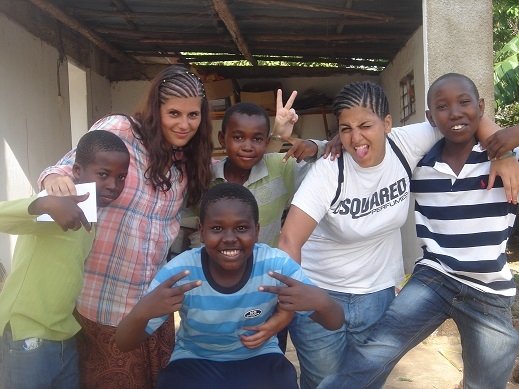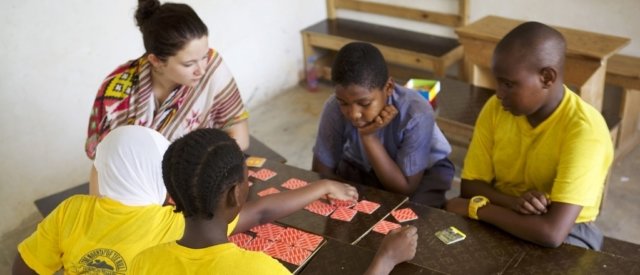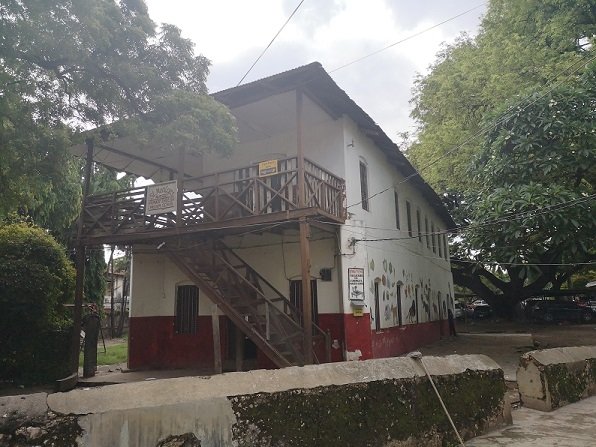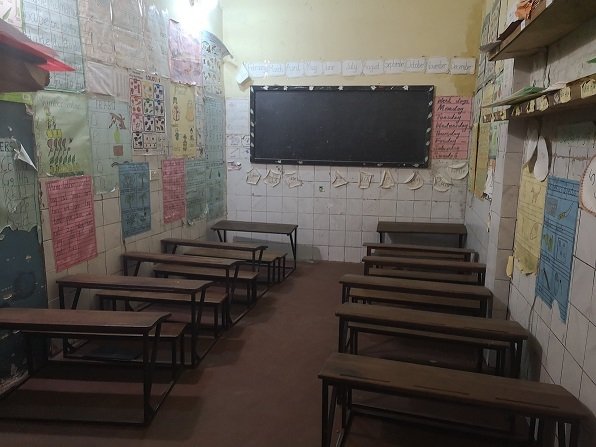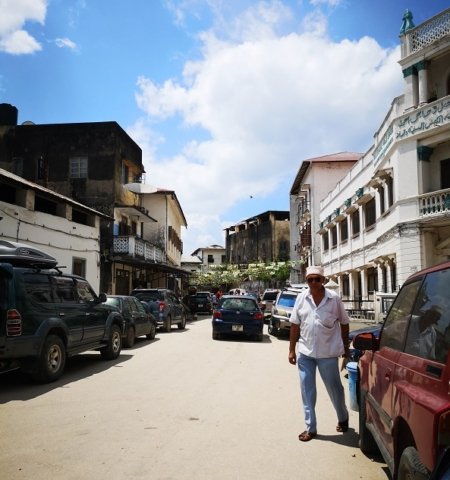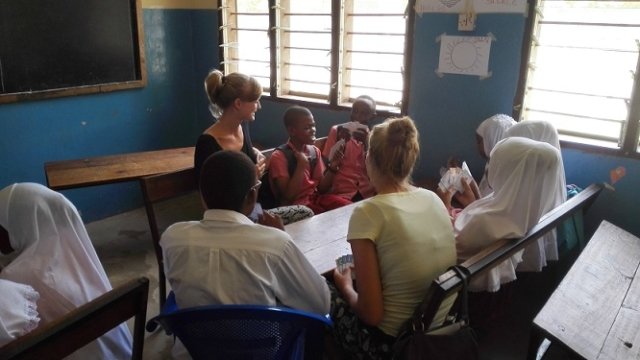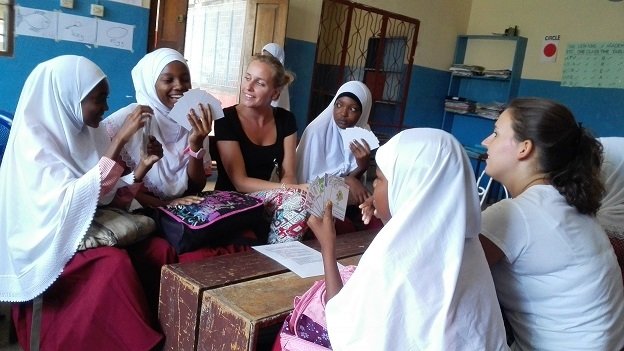
Volunteer as an English teacher and get the opportunity to live and work on a jewel like tropical island off the coast of Tanzania.
| Minimum Duration: | 2 weeks |
| Cost: | From 295 USD per week |
| Minimum Age: | 18 years |
As a volunteer at this project you will have the opportunity to enjoy the white beaches, clear blue water, coconut palm trees and the lively Zanzibar culture and food.
Needs
In general there are a variety of needs and volunteers should keep in mind that you come to volunteer to help where it is needed most, not just to take part in your favourite activities. So be flexible and open-minded to any changes, or other activities that might need your support a little bit more than the ones you prefer. There is plenty of fun to be had while you work!
There is an ongoing need for financial support. Any possible gifts and donations provided by volunteers and their networks are extremely appreciated.
Guidance and supervision
You will be supervised by our local Khaya coordinators in Stone Town; who will pick you up upon arrival, take you around, introduce you to the school and staff and guide you during your stay.
It is important that volunteers at this project understand the following:
- Tanzania is a peaceful country, but is old-fashioned by Western standards. Be enthusiastic and independent and willing to accept that things can be challenging at times.
- Show respect towards the people and culture of the local community. The people of Zanzibar are 95% Muslim so prepare yourself accordingly.
- At all times, follow rules regarding clothing and appearance. Zanzibar is in the tropics and therefore hot. It is not as strict as the Middle East, so you can dress coolly but modestly, with limbs and shoulders covered if possible. Wear what you like on the beach though!
- Time is a concept that is different in Africa! Volunteers must accept that things don’t move at the rushed pace and in the highly organised way that Westerners are used to. Be patient and learn to appreciate “African time”.
Accommodation
Accommodation is offered with host families in the safe area of Mbwemi just outside Stone Town and close to the airport.
The bedrooms are shared, depending on availability. The houses are furnished to Zanzibari standards and has a nice garden to relax, shops within walking distance and is an easy trip to Stone Town with public transport.
Volunteers will be amazed to discover the friendliness of the people while they marvel at the pristine natural beauty of the island, and admire the unchanged centuries-old buildings of diverse traditional heritage, the vibrant local markets and the inspiring sight of fishing dhows at sunset.
There is plenty of vibrant local nightlife, and Stone Town is a sought-after tourist destination. Volunteers will be able to enjoy the best of both New and Old Worlds, while helping the community. What could be more rewarding?
Meals
You will be served local food 3 times a day which includes meat, chicken, seafood and vegetarian dishes. Zanzibaris love their homemade chips (fries), rice dishes and chapatis (Indian pancakes). Try out some new things and experience what Zanzibar has been famous for for centuries: spices and good food.
Please keep in mind that we cannot cater for all personal wishes and preferences of individual volunteers. The meals are made according to local standards and while nutritious and well-prepared, may be seen as very basic by Westerners. If you miss your favourite dish, there are plenty of Western-style options at various restaurants in the town to help you supplement your intake, for your own account.
What is Included?
- Personal collection upon arrival from the airport or harbor of Stone Town
- Accommodation in shared rooms
- All meals included
- Guidance and supervision during your stay
What is Excluded?
- Air tickets
- Insurances
- Volunteer permit of 200 USD
- Own drinks and luxury items
- Transport on the island can be arranged with local taxis, which are very cheap.
Starting dates
Volunteers have the option to start or finish with their project at any given time. Keep in mind the Tanzanian school holidays, when the school will be closed, and volunteers will be free to enjoy their spare time or to work on alternative activities such as visiting orphanages, holiday programs or other projects.
Zanzibar, Tanzania
On Zanzibar, time seems to have stood still and people still live traditional lives. Zanzibar has been the entrance of Eastern Africa for centuries and it was here that most slaves were sold and Indian, Chinese and Arabic merchants would arrive to trade their fares and buy spices, ivory and slaves.
The history of Zanzibar has created a unique mixture of Indian, African and Arabic influences which can be seem in its people, food, culture and building styles. Stone Town on Zanzibar is magical; a labyrinth of alleys and walkways barely wide enough for bicycles and pedestrians. Beautifully carved doors lead entrances to a hidden world of carpenters, sowing shops, and Zanzibar family life. Street vendors sell pre-cut mango’s, coffee in little porcelain cups, zamzam (sugared nuts and seeds) and souvenir shops try to lure you in their paradise of beadwork, Maasai dukka’s (colourful robes the Maasai wear), ‘pole pole’ (slowly slowly) T-shirts and beautifully made wood carvings.
It’s hot and humid but a feast to the eye, especially in the evenings when Forodhani Gardens at the seafront transforms in an open-air restaurant, where you can buy grilled squid, miskhaki’s (kebabs of fish and meat), fresh tuna, lobster and all the seafood you can imagine. All this is washed down with freshly squeezed sugarcane juice mixed with lemon and ginger.
Stone Town and the surrounding villages offer volunteers the unique opportunity to enjoy the white beaches, clear blue water, coconut palm trees and the unique Zanzibar culture and food. The island is a popular backpacker’s destination and has a variety of small beach villages, within 30 minutes travel, to enjoy long weekends under the palm trees. The influences of India, Africa and Arabia can be seen in its inhabitants, the food and building styles of the houses. Zanzibar is the place of your dreams and will surprise you constantly when you volunteer there.


